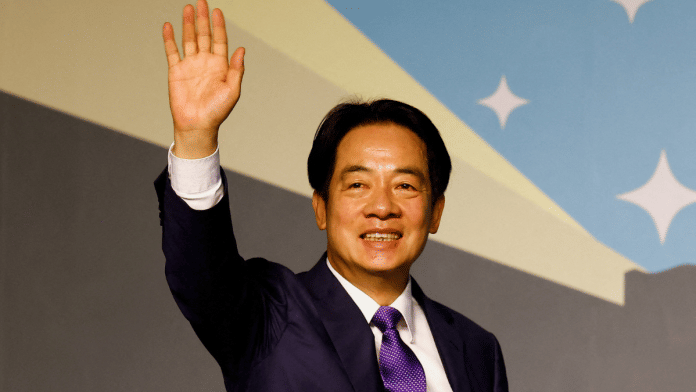Taiwanese President Lai Ching-Te secured a historic third term for the Democratic Progressive Party in January this year. But it was Lai’s inauguration speech on 20 May that China used as a pretext to restart its military coercion. After swearing in as the eighth president of Taiwan, Lai stated, “The Republic of China (Taiwan) is a sovereign, independent nation in which sovereignty lies in the hands of the people.”
Three days after Lai’s inauguration, China conducted a two-day military exercise surrounding Taiwan, codenamed Joint Sword-2024A. State-owned media and officials in China framed the exercise as a form of ‘punishment’ directed at ‘Taiwan separatists’ (read Lai and DPP), issuing a severe warning against ‘external interference or provocation’ (read the US).
Lai’s characterisation of Taiwan as an independent nation was not unprecedented for a Taiwanese president, and his calls for dialogue with China were consistently ignored. Moreover, Beijing’s selective reaction to his speech is purely based on its preconceived notions about him.
Declaration of war
The Chinese government, State-owned media, and analysts are attributing the military exercise to Lai’s speech, accompanied by violent and belligerent rhetoric from China’s Ministry of Foreign Affairs. Hua Chunying, the ministry’s former spokesperson who has since been elevated to Vice Minister of Foreign Affairs, took to X (formerly Twitter) to warn others, “Seeking “Taiwan independence” is playing with fire. Those who play with fire will perish by it.” Another spokesperson of the ministry, Wang Wenbin, denounced Lai and accused him of betraying his nation and ancestors. He added, “All ‘Taiwan independence’ separatists will see their names written on the wall of shame.”
Many analysts of cross-Strait relations in China are adhering closely to the government’s stance. Victor Gao, vice president of the Center for China and Globalization, deemed Lai’s speech ‘tantamount to a declaration of war’. Zhang Hua from the Institute of Taiwan Studies of the Chinese Academy of Social Sciences commented that “Lai made no attempt to conceal his Taiwan independence stance in his speech.” He characterised it as brimming with ‘ignorance, arrogance, hostility, and provocation’, further asserting that Taiwan is depending on the US to seek independence.
Chinese search engines have featured articles suggesting that Taiwanese society, purportedly uneasy with Lai’s speech, feared its impact on cross-Strait relations. Chinese State media and a number of articles by Chinese analysts are actively portraying Lai as a troublemaker, and his speech as unwelcome among the Taiwanese populace. These articles, quoting mainly pan-blue Taiwanese scholars, aimed to present views representative of entire Taiwan. One report, relying on a select few commentators, claimed that “Lai’s ‘provocative speech’ and assertive approach towards mainland China are exacerbating cross-Strait tensions, potentially leading to conflict within Taiwan and adverse economic consequences for its inhabitants.”
An op-ed in Communist Party of China’s (CCP) Xinhua News Agency depicted Lai’s inauguration speech as ‘revealing his true intentions’. It accused the president of deceitful political lies, promoting the fallacy of Taiwan’s independence, inciting cross-Strait confrontation, and advocating for relying on foreign countries to seek independence and “seeking independence by force”.
While the Chinese micro-blogging site Weibo censored at least 20 hashtags related to Lai’s swearing-in and restricted discussions, sentiments expressed on the platform regarding Taiwan overwhelmingly oppose Lai. They often veer into vitriolic language and fuel disinformation. Notably, Hu Xijin, former editor-in-chief of the Global Times, referenced on Weibo an unverified open letter purportedly from a Taiwanese Air Force pilot. The letter alleged low morale among military personnel due to the perceived impossibility of Taiwan winning a war and accused Lai of inflaming tensions with China.
Also read: What do Chinese think of Beijing-Moscow partnership? Russia is both ‘comrade and problem’
China needed an excuse
Cognitive warfare is currently reaching its zenith in China. It can be observed on Mandarin-language online platforms, which are aimed at influencing Taiwanese audiences. Chinese media and officials have been actively striving to depict Lai as a problem and a catalyst for tensions.
Since former speaker of the US House of Representatives Nancy Pelosi’s visit to Taiwan in August 2022, China has unmistakably signalled the establishment of a new norm wherein military coercion is not only prevalent but also deemed justifiable. Beijing is reluctant to engage with Lai because it perceives him as a separatist and an agitator. No number of assurances from Lai and the US will convince Beijing to engage with Lai or restore cross-Strait peace.
While this stance may not necessarily imply an imminent invasion, it undeniably escalates geopolitical tensions and suggests that if Taiwan does not remain isolated, invasion becomes a plausible scenario. Furthermore, China has intensified its campaign to uphold and propagate its distorted interpretation of the ‘One China’ policy.
Although the likelihood of continued military manoeuvres and rhetoric between Taiwan and China remains high, Lai’s speech did not significantly deviate from past precedent or constitute a deliberate provocation. It is Lai’s pro-Taiwan stance that Beijing refuses to accept, hindering efforts to restore peace and revive dialogues.
Sana Hashmi is a fellow at Taiwan Asia Exchange Foundation and George H. W. Bush Foundation for U.S.-China Relations. She tweets @sanahashmi1. Views are personal.
(Edited by Ratan Priya)






